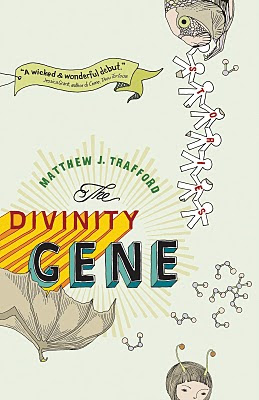
Toronto writer, Matthew J. Trafford, gets a two-book publishing deal with Douglas & McIntyre, with The Divinity Gene coming out next month. Find out what this collection of stories is about, how Matthew got published, and how he likes his coffee.
What is your debut collection of short stories, The Divinity Gene, all about?
There are ten stories in the collection and they're pretty different when it comes to style, voice, and subject matter. A couple of the stories deal with issues around science and technology, like cloning. Some deal with religious and mythological figures like mermaids or the devil. But at their core, all of the stories are really about emotional relationships, the frailty of the heart.
What inspired you to write these stories under a particular theme?
My stories tend towards the magical and the fantastical, but are grounded in the reality of contemporary daily life and human emotion. I’m often inspired by the strange situation or magical possibility first, and then the emotional theme seeps into the writing as the story develops.
The stories aren’t linked; each one can stand alone. But when you look at them as a collection, certain themes do tend to emerge. I would say that identity politics, the relationship between parents and their children, loss and grieving, and the search for love are the main themes of the book.
Describe a typical writing day for you, while you worked on this book.
Even though my book is being published, I still feel like a hack because I never successfully maintained a daily writing practice. Even when I did manage to write every day, no two were the same.
At first I was working on the stories as part of my MFA, which I was completing while juggling a few jobs, so my writing tended to be deadline-driven and done in fits and starts, sometimes pulling all-nighters. The whole time I was working on the book I lived in a house with three (sometimes four) other people, with their own erratic comings-and-goings and no guaranteed 'quiet time.' But somehow this worked for me, grabbing an hour here or there whenever I could.
I am a big fan of house sitting and I did that often – those were generally long days when I would write for hours at a time. But even the physical act of writing is all over the place with me: sometimes I work longhand in a journal, sometimes on my computer, sometimes at home, sometimes in a library. I do have a version of a “perfect workday” in my head, but it never quite happens in reality, and ultimately I’m OK with that.
What was the pitching process like when you were contacting publishing houses? Any advice for new writers who are looking to shop their manuscripts around?
The best advice I can offer is to concentrate on producing the very best work you can. It sounds simple, but it really is key: good writing will get people excited, get people talking, and get people to take a look (or second look). Then, even if they have to pass because a manuscript isn’t right for them, they will remember your name and quite possibly suggest other places to send the manuscript or other people who might be interested.
My manuscript was rejected twice in the first few months following my graduation from UBC’s Optional-Residency MFA program. After that I felt very stuck, and unsure of how to proceed. Then two things happened that I think were key: I was accepted to the Banff Writing Studio and undertook massive revisions while I was there, cutting two stories that weren’t working and really improving many of the others. Second, I had a story accepted into the anthology Darwin’s Bastards: Astounding Tales from Tomorrow.
It was the title story of my book, and on its merits the anthology’s publisher, Douglas & McIntyre, asked to have a look at my entire (and newly improved) manuscript. After another few months of anxious waiting, they made me an offer.
Where can people snag a copy of The Divinity Gene?
As of February 12th, the book will be in stores. I always encourage people to support local independent bookstores (if there are any left!), but of course the book will be in the big-chain box-stores too. Another option is to order online. For people with e-readers, an e-book version will be available as well.
How do you like your coffee?
Most days it’s black. But I like to mix it up – sometimes I take cream and sugar as a treat, sometimes just cream or just sugar.






0 comments:
Post a Comment